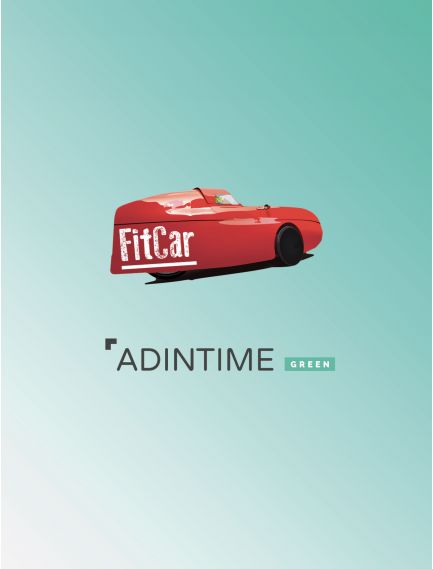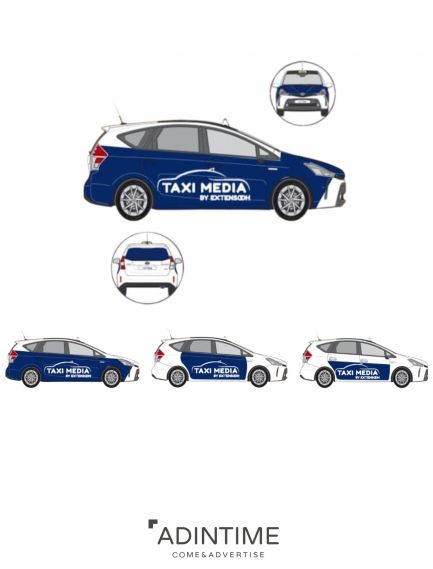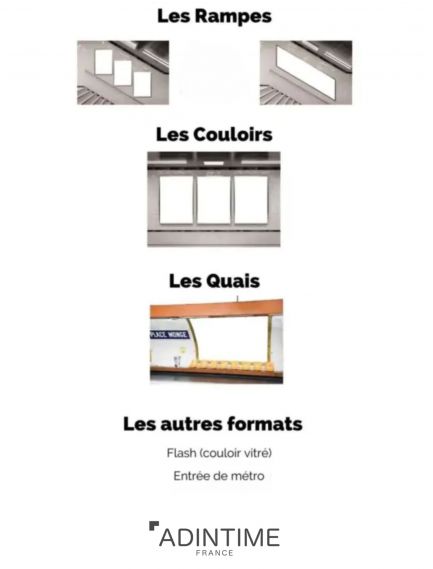The billboard is the advertising medium that allows you to promote your brand, your values, your products or your services. There are many regulations on outdoor advertising that must be respected to ensure the protection of the environment and the landscape. We help you to understand everything about the regulation of billboards, from their location to the authorisation of visuals.
Summary of advertising display regulations:
- The different types of outdoor advertising displays
- Regulations on the location of advertising panels in France
- Regulations on visuals
- Conditions by sector of activity
- What does the law say about illegal billposting?
The different types of outdoor advertising displays

Outdoor advertising has many advantages: more visibility to the general public, short and effective message, elaborate design, 24-hour advertising...
Here are the different types of outdoor advertising displays:
Regulations on the siting of advertising panels in France
The law has established regulations for billboards to avoid visual pollution from advertising and to respect the environment as much as possible: "Outdoor advertising is subject to regulations that protect the environment and the living environment. Its installation must respect conditions of density and dimensions and requires a declaration or a prior authorisation. Source: entreprendre.service-public.fr
Therefore, billboards cannot be placed just anywhere. It is the town halls that decide where to put up your billboard, after receiving all the information from the advertising agencies. The town halls work with a system of calls for tender to which the advertising agencies respond. A great competition for the advertising agencies!

Outdoor advertising is not allowed outside built-up areas. However, outdoor advertising is authorised outside built-up areas in certain cases: "within the boundaries of airports as well as railway and bus stations and sports facilities with a capacity of at least 15,000 seats, in accordance with the requirements set by decree in the Council of State. Source : pays-fontainebleau.fr
Where is advertising prohibited?
- On buildings classified as historical monuments
- On natural monuments
- In national parks and nature reserves
- On trees
>>> If you want to communicate at an airport and reach a very large audience, think of the billboards at Orly airport.
An exception for advertising on bus shelters

For bus shelters, there is a difference in the locality of the advertising posters. Advertising on bus shelters is only possible on a national level. For example, a billboard network cannot be set up only in Paris or Lyon.
>>> 7 advertising devices for effective local communication!
An example of an outdoor sign that is annoying to passers-by
Digital billboards like these are considered a nuisance to passers-by and to the environment.

It is a type of device that has an impact on the environment because of its high energy consumption. Because of its brightness, it is disruptive to the environment and can be perceived as "aggressive" in the landscape.
Localities that limit billboards
For several years now, the city of Montauban has opted for a "cleaning" operation of its territory. Indeed, the town hall (thanks to the local advertising regulations, also called RLP) is removing more and more of its advertising panels located at the entrances to the town. In 2009, the town had 627 outdoor billboards compared to 250 today.
In Rennes, there are environmental activists who voluntarily take down many advertising posters. Why do they do this? To encourage advertisers to slow down or stop visual and environmental pollution. They then replaced the old posters with new ones that clearly explain the environmental issues.
The regulation on visuals

Advertising visuals have rules to follow, are prohibited:
- Advertising messages that imitate those of another company
- Messages that denigrate another company or one of its products
- Unauthorised messages that use the work or brand of another
- Misleading advertising
- Misleading advertising: misleading the consumer with false messages
Advertising signs also require maintenance. The law stipulates that advertising devices must be well maintained. Therefore, posters that have become detached over a long period of time and defective digital displays are in violation.
Conditions to be met by sector of activity

Many industries are highly regulated, here are some signage regulations to consider if your business is categorised in one of these industries.
Regulation of poster advertising in the health sector
A highly regulated sector: the product communicated must be offered for sale to the general public and have the authorisation of the ADEME. It is therefore necessary to take into account the time required to accept the product for sale; the preparation of your advertising message should be planned well in advance.
The following information must appear on the visual of your advertising poster: "This product is a medical device", "Consult your doctor", etc.
Regulation of display advertising in the financial sector
Since 1 January 2017, promotional messages on speculative and very risky financial contracts have been banned (Sapin II law). The ban is aimed at advertisements promoting binary options (a tool for speculating on the evolution of a stock over a short period of time), forex trading (simultaneous buying and selling of currencies) and CFDs (Contract for Difference). The Autorité des Marchés Financiers (AMF) and the Direction générale de la concurrence, de la consommation et de la répression des fraudes (DGCCRF) are in charge of these bans.
Regulation of poster advertising for doctors/practitioners
Advertising and communication may now be conducted by physicians. According to the law, the practitioner may now communicate to the public, freely and by any means, information likely to enlighten the patient when choosing a doctor. This information includes, in particular, that associated with his "professional skills and practices, his professional background and the conditions of his practice".
Nevertheless, advertising must respect the ethical rules and dignity of the medical profession: it must be fair and honest, not rely on the testimony of a third party and not be comparative. In addition, it must not be used as a means of encouraging the patient to seek care unnecessarily, or mislead the public.
The regulation of billboard advertising for lawyers/notaries
For lawyers: the Hamon law allows lawyers to advertise. They can solicit their future clients in a personalised manner. However, it is forbidden:
- Include denigrating statements or compare themselves to other colleagues
- Disseminating advertising containing lies with the aim of deceiving the targeted clients
- Communicating through SMS, telephone solicitations (canvassing) or physical solicitations
- Communicating by referring to other activities or services other than those specific to his function
For notaries, the law states that these professionals may communicate by carrying out "general informative advertising about the notary's office, the services it can offer and the means it has at its disposal to meet clients' needs".

Regulation of tobacco and alcohol poster advertising
Not all alcohol advertisements are banned. However, there is a strict framework. You should therefore take into account the legislative provisions before broadcasting your communication. With regard to tobacco advertising: the Evin law is the ban introduced in 1991 on all forms of direct or indirect advertising or propaganda concerning products intended to be smoked, sniffed, chewed or sweetened which contain tobacco, as well as products intended to be smoked, even if they do not contain tobacco.
Alcohol displays have conditions with a mandatory statement such as "Alcohol abuse is dangerous for your health, consume in moderation".

It was noted that in some cities alcohol advertising is not allowed (e.g. on buses in Rennes).
Regulation of display advertising in the food sector

You have probably already heard or read the following messages: "For your health, eat at least five fruits and vegetables a day" or "For your health, avoid eating too much fat, too much sugar or too much salt". There are 4 variants of this legal notice:
- For your health, eat at least five fruits and vegetables a day
- For your health, practice regular physical activity
- For your health, avoid eating too much fat, too much sugar and too much salt
- For your health, avoid snacking between meals
These statements are compulsory for all poster, press and TV advertisements of food companies offering processed products. It is also important to know that for poster campaigns, the 4 statements must appear on the posters in turn and must all be present on the advertising posters of a network of advertising panels.
As an example, for a network of 40-sided billboards, it will be necessary to provide:
- 10 visuals with the words "For your health, eat at least five fruits and vegetables a day
- 10 visuals with the words "For your health, practice regular physical activity".
- 10 images with the words "For your health, avoid eating too much fat, too much sugar and too much salt
- 10 images with the words "For your health, avoid snacking between meals
In short, instead of printing one visual for the entire poster network: 4 different ones are needed. Therefore, this marketing strategy may have additional costs.
Advertising with QR codes
Advertising campaigns that include a QR code must specify what the QR code refers to (e.g. a website or an application).
QR codes are not allowed for advertising displays with a dating theme.

If these conditions are not met, companies will have to pay a fine and must withdraw their advertising campaign.
Example of an advertisement banned by an advertising agency because of its visual
The front page of Têtu magazine refused to be displayed in stations: SNCF and RATP did not want to display Bilal Hassani for religious reasons.
Indeed, the advertising agency Mediatransports did not want to display these posters because of the religious references that appeared on them; the front page of the magazine was considered too Christian to be displayed in stations and subways in France.

The front page of Têtu magazine shows celebrity Bilal Hassani for his title of "Personality of the Year" in 2021.
What does the law say about billboards?

Illegal billposting is officially prohibited in France and punishable by law. This method of posting consists of putting up posters outside of traditional advertising boards.

Those responsible for posting signs that do not comply with the regulations can be fined up to €1,500.
It is also stipulated that, 'as soon as an irregular advertisement [...] is observed [...] the competent police authority shall issue an order, within five days' and under penalty, 'either to remove or to bring into conformity [...] the advertisements'. It may even "proceed ex officio with the immediate removal of this advertising". The "costs of the ex officio execution shall be borne by the person who has affixed or caused to be affixed this advertising".
However, these displays have unofficial locations. Some advertising agencies offer this service, while including the price of the fine in the quote.
>>>Top 5 benefits of OOH advertising.
















 Top 30 best ads musics
Top 30 best ads musics
 The influence of advertising on purchasing behavior
The influence of advertising on purchasing behavior
 Top of the most listened podcasts in France
Top of the most listened podcasts in France
 Top 30 best ads 2021 in France
Top 30 best ads 2021 in France
 This Year Marketing Calendar
This Year Marketing Calendar
 OOH Advertising: My honest review
OOH Advertising: My honest review
 Facebook Ads Library: The ultimate guide to winning campaigns
Facebook Ads Library: The ultimate guide to winning campaigns
 How to prepare your advertising campaigns for Christmas?
How to prepare your advertising campaigns for Christmas?
 The top 20 ad films of the year
The top 20 ad films of the year
 Example of a unique selling proposition
Example of a unique selling proposition









